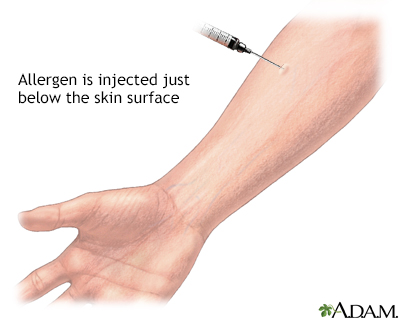Pregnancy SmartSiteTM
Aspergillus infection DefinitionAspergillosis is an infection or allergic response due to the aspergillus fungus. CausesAspergillosis is caused by a fungus called aspergillus. The fungus is often found growing on dead leaves, stored grain, compost piles, or in other decaying vegetation. It can also be found on marijuana leaves. Although most people are often exposed to aspergillus, infections caused by the fungus rarely occur in people who have a healthy immune system. There are several forms of aspergillosis:
SymptomsSymptoms depend on the type of infection. Symptoms of allergic bronchopulmonary aspergillosis may include:
Other symptoms depend on the part of the body affected, and may include:
Exams and TestsYour health care provider will perform a physical exam and ask about your symptoms. Tests to diagnose aspergillus infection include:
TreatmentA fungus ball is usually not treated with antifungal medicines unless there is bleeding into the lung tissue. In such a case, surgery and medicines are needed. Invasive aspergillosis is treated with several weeks of an antifungal medicine. It can be given by mouth or IV (into a vein). Endocarditis caused by aspergillus is treated by surgically replacing the infected heart valves. Long-term antifungal medicines are also needed. Allergic bronchopulmonary aspergillosis is treated with medicines that suppress the immune system (immunosuppressive medicines), such as prednisone, typically in conjunction with antifungal medicines. Outlook (Prognosis)With treatment, people with allergic bronchopulmonary aspergillosis usually get better over time. It is common for the disease to come back (relapse) and need repeat treatment. If invasive aspergillosis does not get better with treatment using medicine, it eventually leads to death. The outlook for invasive aspergillosis also depends on the person's underlying disease and immune system health. Possible ComplicationsHealth problems from the disease or treatment include:
When to Contact a Medical ProfessionalContact your provider right away if you develop symptoms of aspergillosis or if you have a weakened immune system and develop a fever. PreventionPrecautions should be taken when using medicines that suppress the immune system. ReferencesThompson GR, Wiederhold NP, Patterson TF. Aspergillus species. In: Blaser MJ, Cohen JI, Holland SM, et al, eds. Mandell, Douglas, and Bennett's Principles and Practice of Infectious Diseases. 10th ed. Philadelphia, PA: Elsevier; 2026:chap 263. Walsh TJ, Patterson TF. Aspergillosis. In: Goldman L, Cooney KA, eds. Goldman-Cecil Medicine. 27th ed. Philadelphia, PA: Elsevier; 2024:chap 311. | |
| |
Review Date: 5/12/2025 Reviewed By: Jatin M. Vyas, MD, PhD, Roy and Diana Vagelos Professor in Medicine, Columbia University Vagelos College of Physicians and Surgeons, Division of Infectious Diseases, Department of Medicine, New York, NY. Also reviewed by David C. Dugdale, MD, Medical Director, Brenda Conaway, Editorial Director, and the A.D.A.M. Editorial team. The information provided herein should not be used during any medical emergency or for the diagnosis or treatment of any medical condition. A licensed medical professional should be consulted for diagnosis and treatment of any and all medical conditions. Links to other sites are provided for information only -- they do not constitute endorsements of those other sites. No warranty of any kind, either expressed or implied, is made as to the accuracy, reliability, timeliness, or correctness of any translations made by a third-party service of the information provided herein into any other language. © 1997- A.D.A.M., a business unit of Ebix, Inc. Any duplication or distribution of the information contained herein is strictly prohibited. | |

 Aspergilloma
Aspergilloma Pulmonary aspergil...
Pulmonary aspergil... Aspergillosis - ch...
Aspergillosis - ch... Aspergillus antige...
Aspergillus antige...
